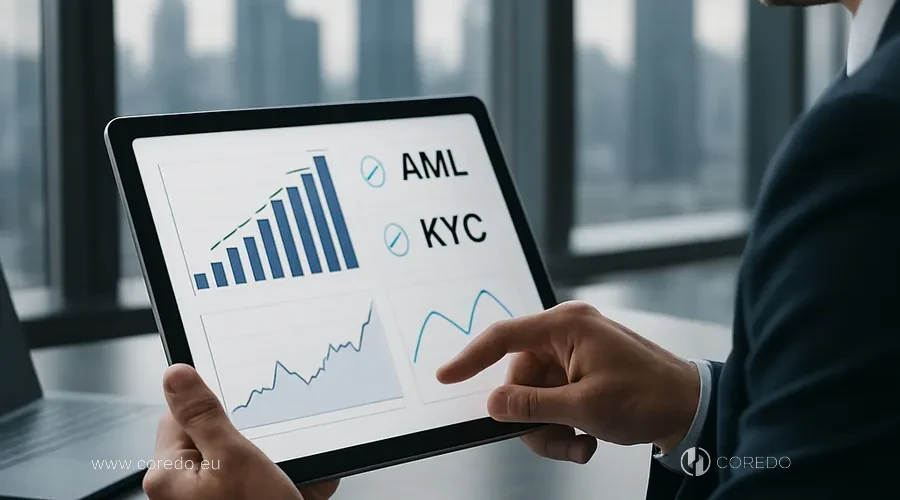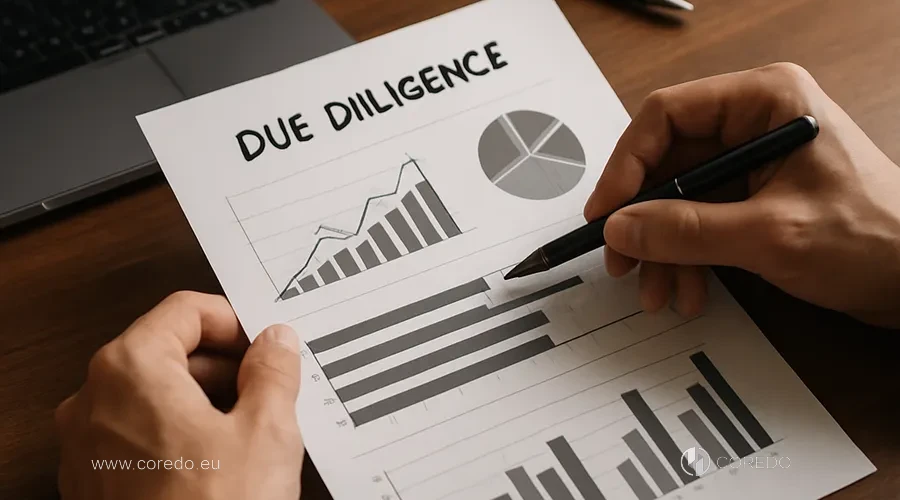This article is not just a theoretical overview, but a practical guide based on the experience of COREDO in supporting fintech businesses in the markets of the EU, Singapore, the UK, the UAE and the CIS. I will explain how to build a Due Diligence system that will become not a burden, but a driver of growth and scaling. If your goal is to take the company to a new level, avoid fines and increase investment attractiveness, I recommend reading to the end: here you will find answers that really work.
Due diligence for fintech companies: what does it mean?

Due Diligence is not just a check, but a comprehensive systemic assessment of the financial, legal, technical and operational condition of a business. In fintech, Due Diligence takes on special significance due to the high market dynamics, the specifics of digital products and multi-level regulatory requirements.
In COREDO’s practice we distinguish several key types of Due Diligence:
- Financial Due Diligence: an in-depth analysis of financial statements, cash flows, debt load and investment risks.
- Legal Due Diligence – examination of licenses, contracts, ownership structure, litigation risks and compliance with standards (GDPR, AML, PSD2, etc.).
- Technical Due Diligence – audit of IT infrastructure, cybersecurity, platform scalability, technical debt.
- Operational Due Diligence – assessment of business processes, internal controls, corporate governance and compliance.
Why Due Diligence matters for fintech
COREDO has repeatedly encountered cases where lack of proper due diligence led to payment blocks, investigations by regulators and the collapse of M&A deals.
Components of Due Diligence in Fintech

The key components of Due Diligence in fintech are the foundation of a comprehensive review that helps investors and partners objectively assess a business, identify hidden risks, and ensure transparency across all processes. In fintech, individual review blocks take on particular importance, each revealing a critically important aspect of a company’s resilience and reliability.
Financial Due Diligence: analysis of stability
Financial Due Diligence begins with an in-depth analysis of financial statements: the balance sheet, the profit and loss statement, and the cash flow statement. At COREDO we apply methods to assess debt burden, analyze creditworthiness, identify hidden liabilities, and evaluate ROI metrics for each project.
We pay special attention to financial modeling and forecasting: this allows us to identify potential cash gaps, assess investment profitability, and prepare the company for scaling or capital raising.
Legal Due Diligence: protection against risks
Legal Due Diligence covers the review of licenses, permits, analysis of corporate agreements, ownership structure, litigation, as well as compliance with GDPR and AML requirements.
Solutions developed at COREDO include intellectual property audits, corporate governance analysis, and identification of potential legal obligations across different jurisdictions.
Technical due diligence: evaluation of IT infrastructure
Technical Due Diligence in fintech is not just an audit of IT systems, but a comprehensive assessment of architecture, cybersecurity, scalability, and technical debt.
The COREDO team has implemented projects where technical audits identified critical vulnerabilities that could lead to data breaches and violations of ISO 27001 or SOC 2 standards.
Due Diligence: Analysis of Business Processes
Operational Due Diligence includes analysis of key business processes, internal control systems (ERM), compliance, human resources management, as well as evaluation of suppliers and partners.
A comprehensive assessment of business processes makes it possible to identify weaknesses and optimize corporate governance.
AML and KYC in Due Diligence for fintech

Anti-money laundering procedures: mandatory requirements
Fintech Due Diligence at COREDO always includes the implementation of anti-money laundering standards, monitoring of suspicious activity, and client identification and verification.
In the EU and Singapore, regulators require not only the implementation of AML procedures, but also regular reporting, cooperation with regulators, and compliance with international standards (FATF, 6AMLD).
Know Your Customer (KYC): client verification
COREDO implements automated solutions for KYC, including biometric verification, big data analysis, and integration with international databases.
Stages of Due Diligence in Fintech

Stage 1: Planning and Preparation
Any Due Diligence begins with strategic planning: defining objectives, the scope of the review, assembling a team of experts, and developing a plan that takes industry specifics into account.
Information Gathering and Vulnerability Assessment
At this stage we collect and analyze financial, legal, and technical documentation, test IT systems, interview key personnel, and analyze the competitive environment.
Risk Analysis and Assessment
All identified risks are classified by category: financial, legal, operational, reputational, tax.
COREDO’s solutions allow assessing the severity and likelihood of each risk, matching them with potential threats, and setting priorities for corrective measures.
Stage 4: Documentation and Reporting
Final stage: preparing a detailed report describing identified issues, assessing their severity, and providing recommendations for remediation.
Due Diligence when registering a company in the EU and Asia

Key aspects of due diligence when registering in the EU
Registration of legal entities in the EU requires strict compliance with GDPR, AML and compliance procedures.
COREDO supports clients at every stage: from selecting the optimal jurisdiction to licensing and implementing corporate governance systems.
Registration timelines depend on the country, but with proper preparation and expert support the process takes from 1 to 3 weeks.
Due Diligence when entering Asian markets
In Asia (Singapore, Hong Kong, Japan) licensing and AML requirements may differ in details, but they are always stringent.
The COREDO team has implemented projects where special attention was paid to counterparty due diligence, analysis of currency and tax risks, and working with local consultants to meet the specific requirements of each jurisdiction.
Advantages: speed of registration (from 15 minutes to 3 days), transparency, access to international financing, but also strict ongoing compliance and mandatory reporting.
Due Diligence for companies in Africa
COREDO helps build AML processes, combat terrorist financing, analyze the risks of working with local partners and consultants.
Special attention is paid to licensing financial services and checking the reputation of counterparties.
Due Diligence for investors and M&A transactions
Due Diligence for investments in fintech
Investors require transparency and full disclosure of information: financial statements, ownership structure, compliance, assessment of investment risks and ROI metrics.
В COREDO мы готовим компании к инвестиционным раундам, формируем документацию, отвечаем на типичные вопросы инвесторов и сопровождаем переговоры до закрытия сделки.
Due Diligence in M&A transactions
Legal expertise COREDO helps minimize risks related to integration and subsequent corporate governance.
Due Diligence when preparing for an IPO
An IPO is impossible without comprehensive Due Diligence: preparation of financial statements, review of corporate governance, mitigation of risks and interaction with investment banks and regulators.
Due Diligence Automation: tools and technologies
Artificial intelligence and machine learning in Due Diligence
Modern AI solutions allow automating the analysis of financial documents, detecting anomalies, analyzing contracts using natural language processing, and forecasting risks based on Big Data.
COREDO implements tools that reduce Due Diligence time by 2–3 times and increase the accuracy of risk detection.
Big Data and analytics in Due Diligence
Big data analytics tools make it possible to integrate information from different sources, identify patterns, visualize risks and conduct real-time monitoring.
Due diligence platforms: automation
The market offers platforms that integrate financial, legal, and technical Due Diligence, enabling companies to reduce costs and increase automation ROI.
COREDO helps choose and implement the optimal tools taking into account the specifics of the business.
Due Diligence for startups: what is it?
Due Diligence for fintech startups
COREDO recommends simplified Due Diligence procedures for startups: documenting processes, preparing for the first funding round, minimizing common mistakes.
Due Diligence for scaling
Due Diligence allows assessing the risks when entering new markets, selecting reliable partners, adapting management processes and integrating Due Diligence into corporate governance.
Verification of Counterparties and Partners
Counterparty Checks in Fintech
Counterparty checks are not only an analysis of financial stability, but also an assessment of reputation, compliance with regulatory requirements, creditworthiness, and ongoing monitoring.
COREDO implements automated systems that enable comprehensive partner checks in the EU, Asia, and the CIS.
Due Diligence with International Partners
COREDO’s experience confirms: working with local consultants and experts helps minimize risks and increase the effectiveness of Due Diligence in international transactions.
Practical recommendations and conclusions
Practical recommendations and key conclusions help increase the effectiveness of the Due Diligence process and account for potential risks at each stage of the review. Below are the most common mistakes to avoid so that Due Diligence results truly reflect an objective picture of the business.
Common mistakes in due diligence
- Insufficient depth of analysis
- Ignoring operational and technical risks
- Incorrect assessment of regulatory requirements
- Lack of monitoring after the review is completed
- Insufficient attention to security
- Wrong choice of experts
Best practices for due diligence in fintech
- Comprehensive approach: financial, legal, technical and operational Due Diligence
- Use of automated tools and AI
- Engaging qualified experts
- Documenting all stages
- Regular monitoring
- Integrating Due Diligence into corporate governance
How to choose a Due Diligence consultant
- Assess experience, qualifications and reputation
- Check the portfolio and case studies
- Evaluate cost and ROI
- Agree on timelines and scope of work
- Maintain continuous communication at all stages
Comparative Due Diligence Table
| Type of Due Diligence | Focus | Timeframe | Cost | Application |
|---|---|---|---|---|
| Financial | Financial condition, cash flows, debts | 2-4 weeks | Medium | Investments, M&A, lending |
| Legal | Contracts, licenses, litigation, compliance | 3-6 weeks | High | Registration, M&A, investments |
| Technical | IT infrastructure, security, scalability | 2-4 weeks | Medium-high | Fintech, IT companies, investments |
| Operational | Business processes, management, personnel | 2-3 weeks | Medium | Optimization, integration, M&A |
| Comprehensive | All aspects (financial + legal + technical) | 6-12 weeks | High | IPO, major investments, M&A |
Practical steps for implementing Due Diligence in fintech
Implementing Due Diligence in a fintech company requires a systematic approach and detailed planning of each stage. The practical steps described below will help the company minimize risks, increase process transparency, and comply with regulatory requirements.
Defining Due Diligence objectives
- Choose the type of review (financial, legal, technical, comprehensive)
- Define the timeline and budget
- Form a team of experts
Prepare documentation
- Collect financial statements for 3–5 years
- Prepare legal documents (contracts, licenses, incorporation documents)
- Document the IT infrastructure and security processes
How to conduct the analysis
- Financial analysis (cash flows, debts, profitability)
- Legal review and compliance check
- Audit of technical systems and security
How to identify and assess risks?
- Classify risks by category
- Assess severity and likelihood
- Prioritize corrective measures
Prepare the report and recommendations
- Document identified issues and risks
- Propose recommendations
- Develop an action plan
Implementing the results
- Implement measures to mitigate risks
- Set up monitoring systems
- Integrate Due Diligence into corporate governance
Key takeaways for entrepreneurs
– A comprehensive verification approach (financial, legal, technical, operational) is the foundation of resilience and investment attractiveness.
– AML and KYC, critical elements of Due Diligence: ignoring them leads to sanctions, loss of licences and reputation.
– Automation and AI enable faster and higher-quality Due Diligence, especially when working with large volumes of data.
– regulatory requirements vary across the EU, Asia and Africa; trust experts who understand the specifics of each jurisdiction.
– Due diligence on counterparties and partners: the key to long-term resilience and reducing operational and reputational risks.
COREDO’s experience proves: systematic Due Diligence is an investment in transparency, trust and sustainable growth for your fintech business. If you’re ready to take your company to the next level and minimize risks in any jurisdiction, the COREDO team is always ready to become your strategic partner.